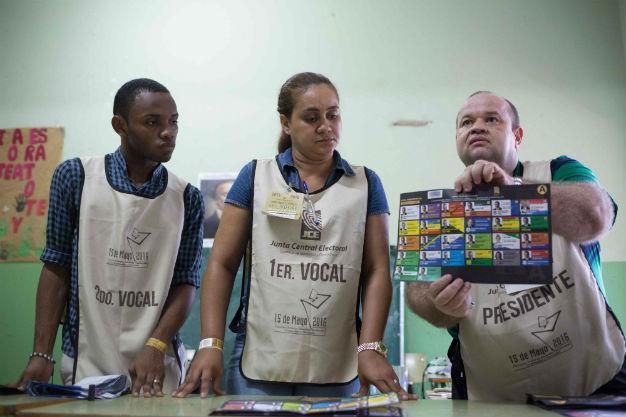Incumbent Medina ahead in early Dominican presidential results
SANTO DOMINGO – Agence France-Presse

AFP photo
President Danilo Medina seemed destined for a sweeping re-election in the Dominican Republic’s vote on May 15, giving him four more years to lead a country with both rapid economic growth and severe poverty.With just over one-third of the results in, Medina had won 61.9 percent of the vote, according to official figures released early on May 16 by government election authorities.
It seemed certain that Medina, a member of the Party of Dominican Liberation (PLD), will avoid a runoff vote with his nearest rival, Luis Abinader of the Modern Revolutionary Party (PRM), who won 35 percent of the vote.
“I voted for continuity. Danilo needs another four years to improve safety and work with the schools,” Roxana Almonte, a 58-year-old secretary at a school in downtown Santo Domingo, told AFP.
Medina’s centrist PLD party has been in power for 12 years in the Spanish-speaking country, which shares the island of Hispaniola with its troubled neighbor, Haiti.
The president had been favored to beat his seven rivals, especially since the breakup of the once powerful Dominican Revolutionary Party (PRD). Abinader, 48, belongs to a break-off PRD faction.
In a country that endured the dictatorship of Rafael Trujillo (1930-1961), U.S. military interventions, and lifetime politicians like three-time president Joaquin Balaguer, some voters worry about the PLD’s iron grip on power.
Medina however can brush this off: he enjoys a stellar 89 percent approval rating, according to a survey by Mexican consultancy Mitofsky, making the 64-year-old the most popular leader in Latin America.
Authorities in the popular Caribbean tourist destination, which is beset by widespread poverty, prolonged the vote by an hour after some polling centers opened up to two hours late.
The delays were due to glitches with electronic equipment and a mass resignation of some 3,000 technical assistants, according to the head of the electoral commission, Roberto Rosario, who gave no details on why the workers quit.
Medina called the resignations “irresponsible” as he cast his ballot at a school in the capital of Santo Domingo.
Many polling centers switched to manual balloting due to issues with electronic voting, which was used for the first time.
















